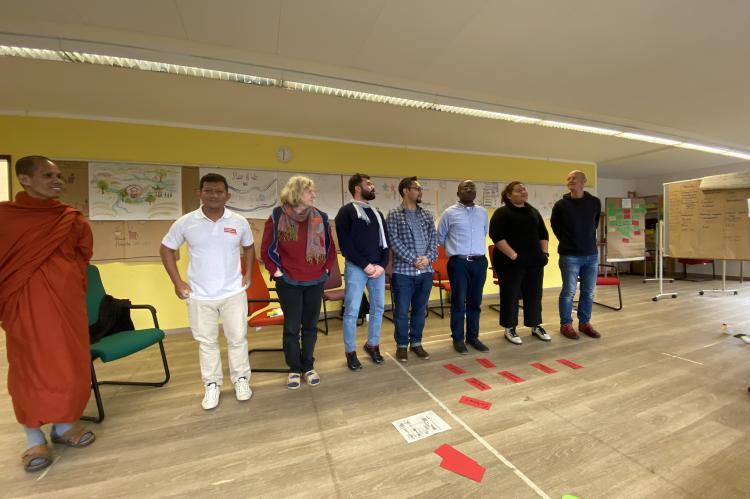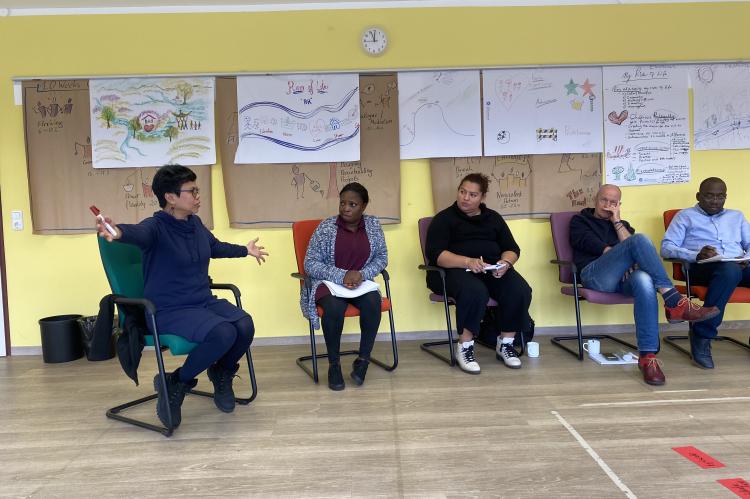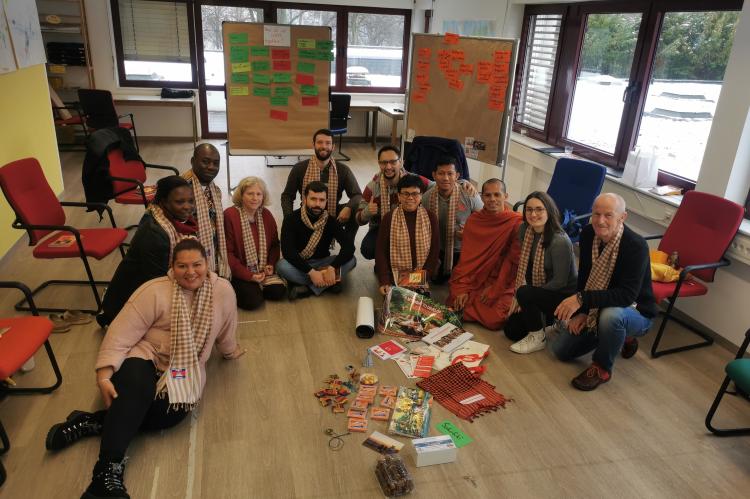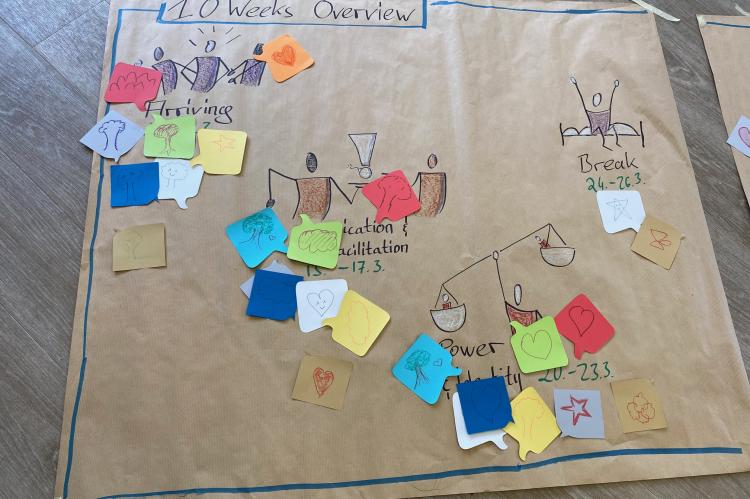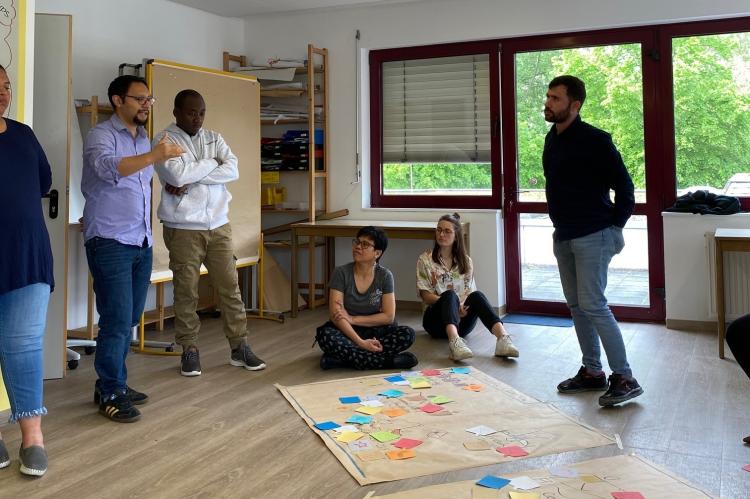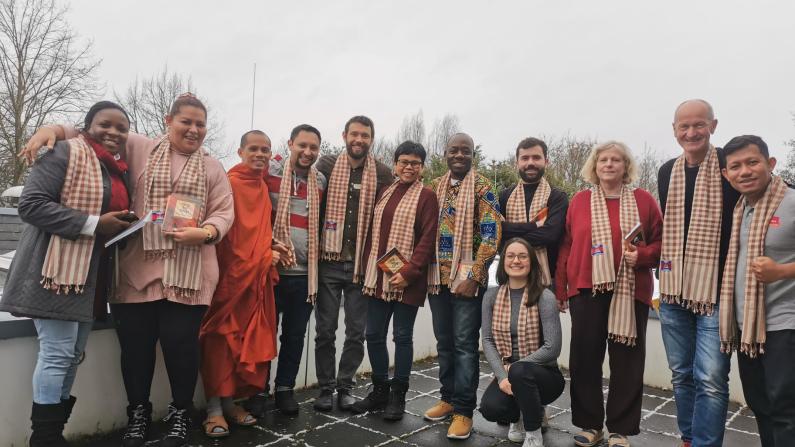
It is the middle of March. The sky in Königswinter is cloudy and it is rainy. The small town is just about nine kilometers from Bonn as the crow flies, directly on the Rhine. From the outside, you would not guess what an exciting group is currently staying there at the Arbeitnehmer-Zentrum. Every year, about 10 participants from different countries come here together for a ten-week training course in peace and conflict work. During this time, they deal with approaches to conflict analysis, learn about methods and tools, and reflect about their own role in peace and human rights work.
The course started three days ago. The participants are motivated and full of expectations. They are looking forward to learning from their different experiences and perspectives. While having coffee during a break, participant Emmanuel Ametepeh tells us that after the course he will go to Mali as a civil peace worker. The course is intended to prepare him for this assignment. "It is important to know the specific context of the conflict region and to deal sensitively with the local people and their experiences of the conflict," advises another participant who has already been working in peace work for over five years. Knowledge of methods is enormously important, but they must always be specifically adapted to the particular region, he explains. Emmanuel Ametepeh is very happy about such advice and the exchange of experiences.
The participants line up according to their height. Then they divide into smaller groups.
Deepening conflict understanding
The participants are just arriving in the course room for the second learning unit of the day. They take their seats in a circle of chairs and are excited what will happen next. The program for today includes clarifying basic terms. But when the course instructors begin to discuss and accuse each other, the room suddenly falls silent. Neither of them seems to have prepared anything for the upcoming session. "I told you that I wouldn't be able to take care of it," says Irene reproachfully. Her colleague Robert denies it. After further recriminations, he rushes out the door indignantly.
It is quiet in the room. No one dares to say anything. What has just happened? That is exactly what Robert asks the participants when he returns after a few moments, laughing. As quickly as it became serious, the mood is also relaxed again. Terms like "conflict" and "misunderstanding" come up. The participants realize that in the simulated argument, communication was the real problem: The supposed squabblers did not seem interested in solving the actual problem.
With this short acting interlude, the course instructors lead over to a new theoretical approach. In this approach, the focus is primarily on the interpersonal relationships in a conflict. The participants learn how important it is to analyze conflicts in detail and on different levels.
Course instructor Irene dela Torre illustrates how complex conflicts are.
Although the participants have only known each other for four days, they already seem very familiar. They laugh a lot and listen to each other attentively and with interest. There is always room for further questions. This often leads to small discussions about topics that are on the minds of the participants. The main topic is the war in Ukraine and the question of how peace work can be approached in such times. Concerning this matter, the course leaders talk about the current work of Pro Peace in Ukraine. But the participants also report on their own work in different regions, which often takes place under difficult conditions. This freedom to share experiences is intentionally allowed in the course, as it enables the participants to get to know each other better and find answers to their questions. "It's good to know that we all face similar challenges," says Carlos Armando Juárez Ramírez, for example. One can learn a lot from the project work in other countries for one's own work. He himself is a lawyer and comes from Guatemala, where he works for human rights.
After only a short period of time the participans are already familiar with each other.
“This is no final goodbye – it is a see you again”
Ten weeks later: It is the penultimate day of the course. The faces of the participants reflect mixed feelings. On the one hand, there is the anticipation of going home. Of meeting family and friends and of upcoming projects. But on the other hand, they are sad to leave their "home" of the last ten weeks. And especially the people they have met here. The team spirit in the course room is more harmonious than ever. It is clear to see how much the international group has grown together. Together they have laughed, pondered, developed ideas and inspired each other.
The penultimate day is therefore dedicated to a review of the past weeks. There are three large posters on the floor showing the course and the individual topics. With the help of symbols and comments, the participants can illustrate how they perceived the individual units. What were the highlights? Which topics were particularly challenging? Which week did they take the most away from for their work?
For a while, the participants silently draw those symbols on the posters and write comments. They take their time and recapitulate what they have experienced. Afterwards, they exchange ideas. The impressions are very different. Depending on their individual work backgrounds, different seminar units were particularly helpful. The units on self-care and power and identity were immensely important for all of them. Even though dealing with these topics was by no means easy, it still inspired him, said one participant. "After working intensively on these issues, you see more clearly," notes another. Emotionally stirring but insightful was the unit on colonization. The participants became aware of how important clear communication and sensibility are, even within their own group.
To test their new knowledge one more time, on this penultimate day of the course, each of the participants think of a method in pairs, which they then apply in the group. One of the pairs asks the participants to think of a word or memory that they associate with the course. Words come up such as: Inspiring, enriching, happy, encounters. Human rights lawyer Carlos Armando Juárez Ramírez says: "The course is a lifetime experience." Some anecdotes are also exchanged and make the participants laugh. Soft music plays in the background. Satisfied, they all reminisce. They are very sure of one thing: "This is not a final goodbye - this is a see you again."
